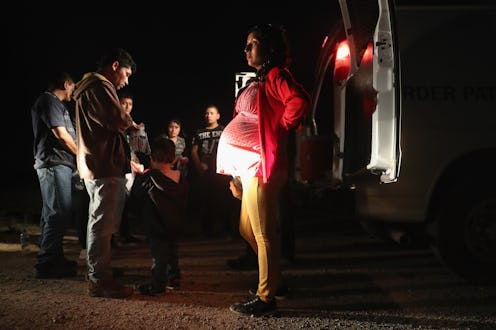News
ICE Isn’t Supposed To Detain Pregnant Women, But They’re Doing It Anyway

The American Civil Liberties Union has become one of the most consistent thorns in the side of President Donald Trump. In just the first month of the administration, the group sued the president over his travel ban on seven majority-Muslim countries and won (though a more limited version of the ban was eventually implemented). Later in the administration, they sued over Trump's attempt to ban transgender individuals from the military. And on Tuesday, the ACLU filed an administrative complaint against ICE for detaining pregnant women.
Since Trump's inauguration, he has been fulfilling his promise to heavily and harshly increase immigration enforcement, including the detention and deportation of tens of thousands of immigrants, many who have lived in the United States for years in decades. In the course of the immigration raids, detainment of women has increased by 35 percent in the first few months of 2017 compared to the previous year, according to a report by KUOW, a Seattle public radio station.
The KUOW report also found an increase in the detainment of pregnant women by ICE, including Jacinta Morales, an undocumented woman in the Seattle area who was arrested by ICE while pregnant. Several weeks after her detainment in an immigration facility, Morales had a miscarriage.
This alarmed immigrant advocates, especially since according to official ICE policy, "absent extraordinary circumstances or the requirement of mandatory detention, pregnant women will generally not be detained by ICE." When KUOW asked ICE for comment, the agency claimed that policy was still in effect.
For advocates of criminal justice reform, the plight of pregnant women in ICE detention falls into a larger pattern of how the incarceration system deals with inmates, especially women. Jessica Jackson Sloan, the founder of Cut50, a nationwide organization trying to reform the criminal justice system, has been fighting for a bill in the Senate that would protect the rights of incarcerated women, including pregnant inmates.
Sloan tells Bustle that this issue is "the latest example of the Trump administration’s failure to recognize the humanity of people - specifically low-income women of color."
This is not the first time this year that ICE has reportedly broken its own policies with regards to protected classes of immigrants, and not the first time that vulnerable women have suffered from the results. Early in 2017, ICE faced criticism for arresting a woman who was at court seeking a restraining order against an abusive partner. This violated ICE policy forbidding enforcement against victims or witnesses in domestic violence cases.
With what seems to be a marked increase in detainment of pregnant women, a group of lawyers at the Refugee and Immigrant Center for Education and Legal Services in South Texas was joined by the ACLU in filing a complaint against ICE, alleging that it is breaking its own policy and violating the civil rights of these pregnant women.
Immigration detention is not supposed to be punitive — its aim is to ensure that immigrants who are given court dates show up and don't flee in fear of deportation. But harsh conditions have been reported at immigration detention facilities before, many of which are private prisons not run by the federal government. Some of the conditions alleged by the complaint are quite dire. The ACLU wrote in its blog post announcing the complaint:
Several women in our complaint report that they were ignored and denied immediate medical care even in cases of extreme bleeding and pain. Others said that they were concerned about their pregnancies because of previous health issues and miscarriages.
"The humane treatment of pregnant women isn’t just an issue in our ICE detention facilities," Sloan says. "Federal prisons still shackle women during labor. Damage from trauma on mothers and babies is well-documented and trauma inflicted at the at the hands of government is a human rights issue.”
Correction: An earlier version of this article stated that the ACLU filed a lawsuit against ICE, not an administrative complaint. The article has been updated to reflect that.